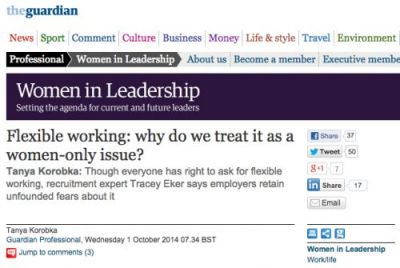We’re In Guardian: Why Do We Treat Flexible Working As A Women-Only Issue?

We’re very proud to be featured in the Guardian.
Since flexible working is something all Millennials and Gen Z care about, I contacted Tracey Eker, the founder of Flexiworkforce.com – the only full-time flexible job board in the UK that caters to all candidates regardless the age or gender.
In our interview, I asked Tracey how flexible work can function as a potential solution to the workplace issues currently faced by the UK.
Here is what Tracey said:
“Europe is currently home to 190 million flexible workers, but our openness to new ways of working is still being outstripped by organisations based in the USA and Australia. In Britain, too many people continue to think that commitment to their job is based on presenteeism, rather than productivity. It can be hard to challenge this deep-rooted outlook. CEOs still fail to grasp the idea that their employees can still be producing quality work even if they are away from their desks. In fact, productivity is boosted by flexibility.”
Generation Y and skill shortage
Flexible working can help with the ongoing skills shortage, one of the biggest threats to the growth of the UK economy. Generation Y employees in particular are much more likely than their parents to take on multiple roles simultaneously. In a sense, this will force employers to accept these individuals under the conditions that they want to work, to attract and retain the high-calibre candidates they require. The latest generation to enter the workplace views work-life balance as non-negotiable, so wellbeing and work–life balance has become a central part of post-recession employment priorities.
Flexible work and gender pay gap
CSR (corporate social responsibility) is a pressing matter for the UK’s top companies. It is the idea that companies should be responsible and ethical, aiming to increase diversity, inclusion and equal opportunities within their workforce.
Flexible working is a big part of this, because it is seen as a way for companies to boost gender equality, and also a way to potentially improve representation of people with disabilities and mental health issues, including those who may not be able to commit to full-time because of healthcare needs or caring duties.
Many continue to view flexible working as being primarily for women, but this is simply not the case. I believe that increased flexible working across the board would ultimately contribute to a fairer society and that the gender pay gap may even vanish after increasing the availability of flexible working opportunities in higher paid occupations. The discrepancy between average salaries for full and part-time workers is a major cause of pay inequality between the sexes because of the fact that women are currently more likely to work part-time than men.
Throughout the years, firms have disproportionately rewarded individuals for working long hours. However, as the prevailing attitudes of employers are changing in favour of results yielded rather than time spent at one’s desk, working longer hours are no longer relevant indicator of productivity.
Flexible working as an option for everybody creates less angst and friction between employees, and men will cease to feel resentment as a result of female employees leaving earlier in order to care for children etc. Flexiworkforce.com aims to make flexible working available to everyone. As flexible working moves form niche to mainstream, it will eventually became the norm, meaning that all employees will be on a level playing field, regardless of gender.
Find out what exactly is full-time flexible work and how it benefits companies. Read the original article in the Guardian.




